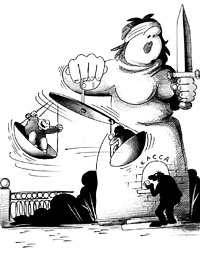Based on the World Bank sources, the level of corruption in transitional countries has gone down during 2002-2005, however, the World Bank also reports that Armenian companies have continued giving bribes.
The World Bank report on Armenian companies based on surveys is entitled “The fight against corruption in transitional countries-Who has achieved and why?” (FACTC-3). The WB concludes that “there is progress in reducing the level of corruption in the Southern Caucasus region.”
However, the World Bank does add that the level of corruption in Eastern Europe and the former Soviet countries remains higher than that of most Western European countries.
So, the level of corruption is considerably low for large companies compared to the small companies, which are the ones helping the economy grow and opening new work places.
FACTC-3 is the third report of the World Bank and it’s based on the results of surveys conducted by the World Bank and the European Bank for Reconstruction and Development (EBRD) on the business environment and businesses in general. This survey is conducted once every three years (the last one was in 2005) in 26 post-Soviet countries and Turkey. The countries are compared to five Western European countries, including Germany, Greece, Ireland, Portugal and Spain.
“Since 2002, companies in most countries rarely give bribes and corruption is not really a big problem as before,” says co-author of the World Bank and elder economist of the World Bank’s European and Central Asia regional issues subdivision James Anderson.
The FACTC-3 generally considers the fight against corruption in transitional countries as positive, but it’s clear that the situation is far from normal in Armenia.
The World Bank states that there is progress in the customs and taxation bodies of transitional countries. For example, the transition from a fixed tax to a profit tax in Slovakia has made companies get a clear picture of what it means to pay taxes. In some countries, the taxing system has improved due to some reforms in the legislation. Some countries have made investments in the IT field and have set limits on state officials to check-up on the property of physical persons.
The World Bank claims that during the past three years, there have been frequent cases of corruption in Armenian courts, as well as taxation and customs bodies.
“Corruption has rose from an already high level in the taxation bodies of Kyrgyzstan, a little higher than the average in Serbia and Chernogoria and the low level has gone up in Armenia,” as stated in the FACTC-3.
It gets more serious when it comes to the court system. The level of corruption in courts of transitional countries has not decreased. However, there are countries fighting against this, such as Russia, Georgia, Croatia and Slovakia.
As a result, we see a decrease in the level of corruption in some countries (Georgia, Rumania, Slovakia) in the past three years, while the number of cases has increased in other countries, such as Albania, Serbia and Armenia. The World Bank likes the fact that Armenia tries to let the people know about their rights, broadcasts the “My Right” court television show and that a state official is the one presiding the court session.
The World Bank has also taken into account the level of corruption in the legislative branch, where the legislative field is formed based on the interests of a small group of people.
It is worth mentioning that the World Bank doesn’t like the fact that the transitional countries are providing their parliamentarians with untouchable guarantees.
Armenian, Uzbekistani and Tajikistani companies don’t really consider corruption a serious issue, as they do in the CIS countries. The specific weight of bribes of Croatian, Latvian, Armenian and Hungarian companies hasn’t really changed during 2002-2005. There is more corruption in the registering and taxing of Armenian, Georgian and Moldovan companies. However, the situation is worse in Azerbaijan, Tajikistan, Kyrgyzstan and Uzbekistan. Corruption has decreased in the business fields of Georgia, Belarus, Croatia and Slovakia, however, it has been a major issue for businesses in Armenia and Macedonia during 2002-2005.
But the most interesting is the World Bank’s evaluation on the strategy for fighting against corruption.
“In 2003, Armenia came up with a strategy and project implementation plan for fighting against corruption and formed a high-class anti-corruption council in 2004 and elected the Prime Minister as president. But the results have shown that things were worse in 2005 than in 2002,” as stated in the World Bank report, taking into account that the Armenian authorities haven’t done anything during those years. The FACTC-3 draws a comparison between Armenia and Georgia, where the anti-corruption strategy and project implementation plan are coherent to the institutional reforms leading to the decrease of corruption. Co-author of the World Bank report Cheryl Gray says that the new Georgian authorities have come to power with the purpose of fighting against corruption and are already thinking about improving governance.
“It’s important to have a leader in the fight against corruption. Each country with a low level of corruption has a good leader that places responsibility above everything else,” says Gray.
I can presume that this means that the level of corruption in Armenia hasn’t decreased in the past three years because the “leaders” haven’t had the desire.

